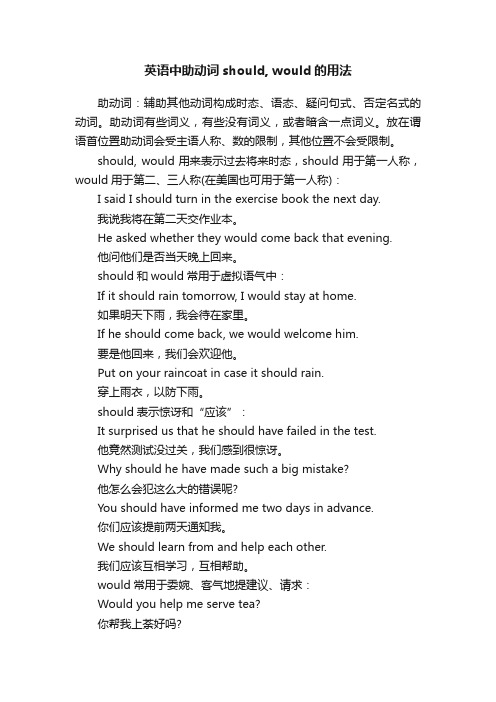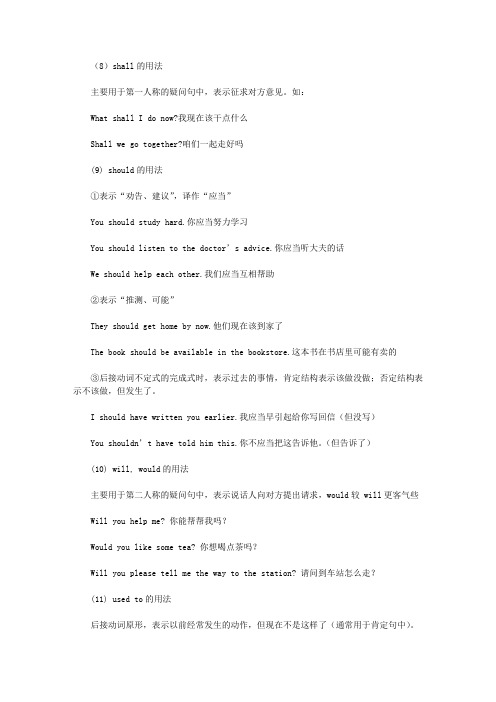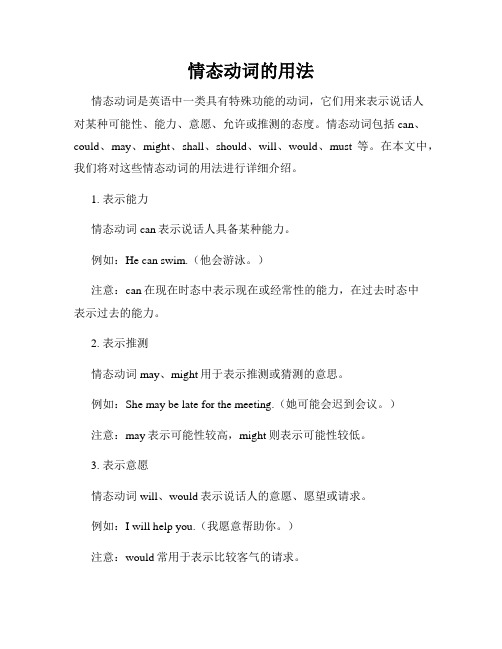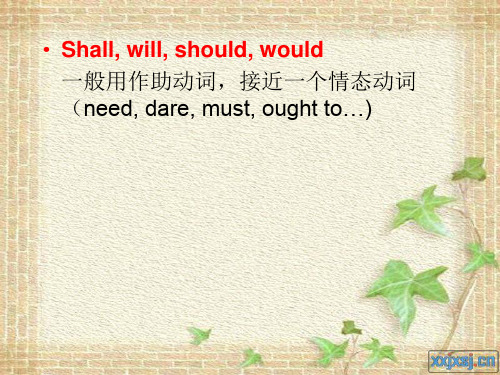should和would用法
should用法总结汇总

千里之行,始于足下。
should用法总结汇总Should是一个情态动词,用于表示建议、意愿、命令、推想等。
它有多种用法和结构,下面将对should的用法进行总结。
1. 表示建议:a. 主语+should+动词原形:用于表示一般性的建议或意愿。
- You should exercise regularly to stay healthy.(你应当经常熬炼以保持健康。
)- We should leave early to avoid traffic.(我们应当提前离开,以避开交通拥堵。
)b. 主语+would/should+动词原形:用于表示有礼貌或客气的建议。
- Would you should drop me off at the station?(你可以把我送到车站吗?)- Should I help you with your luggage?(我来帮你拎行李吗?)c. It is (high) time that+主语+should+动词原形:用于表示“早该……了”。
- It is high time that we should take action to protect the environment.(我们早该实行行动爱护环境了。
)- It is time that you should start looking for a job.(你早该开头找工作了。
)2. 表示命令或要求:主语+should+动词原形:用于表示命令、要求或建议具有强制性的状况。
- You should stop talking in class.(你应当停止在课堂上讲话。
) - They should pay the bill before leaving the restaurant.(他们离开餐厅之前应当先付款。
)第1页/共2页锲而不舍,金石可镂。
3. 表示推想、假设、猜想:a. 主语+should+动词原形:用于表示对某种可能性或预期结果的猜想。
could,would,should,might

would :1. 表will的过去,用于过去将来时2. 表"意愿",乐意做某事3. 虚拟语气could: 1. 表can的过去,表过去的能力2 表请求(婉转语气)3. 表猜测:可能是...4. 虚拟语气should: 1. 表shall的过去,用于过去将来时,搭配第一人称2. 表婉转的语气: 应该做...3. 虚拟语气might: 1. may的过去,表猜测:可能是2. 表许可(婉转语气)may: 1. 表猜测: 可能是2. 表许可think of 想起, 想到; 没有think from的用法一.shall和will的用法1、shall 用在第一、三人称,will 用于第二人称表示“征求意见”。
Shall I go now?Shall we invite her, too?Will you help me with the work?Shall the reporters wait outside or what?2、shall表示依据规定有义务去做。
Passengers shall not talk with the driver while the bus is moving.3、shall 用于所有人称,表示说话人的许诺、威胁、警告、命令等。
You shall have an answer by tomorrow.If he’s good, he shall have a new watch for Christmas.If you children don’t do as I tell you, you shan’t go to the party.4、would 可以表示过去的习惯(would 可表示反复发生的动作或某种倾向。
used to表示过去的习惯动作或状态,强调现在已不存在)He would come to see me on Sunday when he was here.The dog would lie there in the sun all afternoon.When we were children, we would go skating every winter.5、will可以表示“愿意”,而非将来:I will pay you for it. 我会付给你钱买下它的。
英语中助动词should,would的用法

英语中助动词should, would的用法助动词:辅助其他动词构成时态、语态、疑问句式、否定名式的动词。
助动词有些词义,有些没有词义,或者暗含一点词义。
放在谓语首位置助动词会受主语人称、数的限制,其他位置不会受限制。
should, would用来表示过去将来时态,should用于第一人称,would用于第二、三人称(在美国也可用于第一人称):I said I should turn in the exercise book the next day.我说我将在第二天交作业本。
He asked whether they would come back that evening.他问他们是否当天晚上回来。
should和would常用于虚拟语气中:If it should rain tomorrow, I would stay at home.如果明天下雨,我会待在家里。
If he should come back, we would welcome him.要是他回来,我们会欢迎他。
Put on your raincoat in case it should rain.穿上雨衣,以防下雨。
should表示惊讶和“应该”:It surprised us that he should have failed in the test.他竟然测试没过关,我们感到很惊讶。
Why should he have made such a big mistake?他怎么会犯这么大的错误呢?You should have informed me two days in advance.你们应该提前两天通知我。
We should learn from and help each other.我们应该互相学习,互相帮助。
would常用于委婉、客气地提建议、请求:Would you help me serve tea?你帮我上荼好吗?What would you like to eat?你想吃点什么呢?I’d like some vanilla ice-cream.我想要些香草冰淇淋。
初中英语语法之情态动词shall-should-will-would-used-to等用法

(8)shall的用法主要用于第一人称的疑问句中,表示征求对方意见。
如:What shall I do now?我现在该干点什么Shall we go together?咱们一起走好吗(9) should的用法①表示“劝告、建议”,译作“应当”You should study hard.你应当努力学习You should listen to the doctor’s advice.你应当听大夫的话We should help each other.我们应当互相帮助②表示“推测、可能”They should get home by now.他们现在该到家了The book should be available in the bookstore.这本书在书店里可能有卖的③后接动词不定式的完成式时,表示过去的事情,肯定结构表示该做没做;否定结构表示不该做,但发生了。
I should have written you earlier.我应当早引起给你写回信(但没写)You shouldn’t have told him this.你不应当把这告诉他。
(但告诉了)(10) will, would的用法主要用于第二人称的疑问句中,表示说话人向对方提出请求,would较 will更客气些Will you help me? 你能帮帮我吗?Would you like some tea? 你想喝点茶吗?Will you please tell me the way to the station? 请问到车站怎么走?(11) used to的用法后接动词原形,表示以前经常发生的动作,但现在不是这样了(通常用于肯定句中)。
I used to get up early,我以前经常早起(现在不是这样了)He used to read aloud everyday. 他以前天天朗读(但现在不是了)注意:句型“be + used to”后接动名词或名词,表示“习惯……“:I am not quite used to the weather, here. 我不大习惯这里的天气Are you used to the food in Beijing?你现在习惯吃北京的饭了吗?I’m used to getting up early.我习惯早起。
情态动词的用法

情态动词的用法情态动词是英语中一类具有特殊功能的动词,它们用来表示说话人对某种可能性、能力、意愿、允许或推测的态度。
情态动词包括can、could、may、might、shall、should、will、would、must等。
在本文中,我们将对这些情态动词的用法进行详细介绍。
1. 表示能力情态动词can表示说话人具备某种能力。
例如:He can swim.(他会游泳。
)注意:can在现在时态中表示现在或经常性的能力,在过去时态中表示过去的能力。
2. 表示推测情态动词may、might用于表示推测或猜测的意思。
例如:She may be late for the meeting.(她可能会迟到会议。
)注意:may表示可能性较高,might则表示可能性较低。
3. 表示意愿情态动词will、would表示说话人的意愿、愿望或请求。
例如:I will help you.(我愿意帮助你。
)注意:would常用于表示比较客气的请求。
4. 表示推测的过去情态动词must常用于表示对过去情况的推测或肯定。
例如:He must have missed the bus.(他肯定错过了公交车。
)注意:must用于表示对过去情况的肯定,而might用于表示对过去情况的推测。
5. 表示义务或必要性情态动词must表示对义务、必要性或确定性的肯定。
例如:You must finish your homework.(你必须完成作业。
)6. 表示建议或应该情态动词should表示建议或应该。
例如:You should go to bed early.(你应该早点睡觉。
)注意:should还可以表示对过去情况的推测,例如:He should have arrived by now.(他现在应该已经到达了。
)7. 表示允许或许可情态动词can与may可以用于表示许可或允许。
例如:Can I borrow your pen?(我可以借你的钢笔吗?)8. 表示可能性情态动词could用于表示可能性。
would和should的语法点

would和should都是情态动词,它们有以下语法点:
would的用法:
表示过去的意志、愿望或决心。
例如:I knew I would succeed.(我知道我会成功的。
)
表示过去习惯性行为。
例如:He would sit silently for hours.(他会一声不吭地坐上几个小时。
)
表示推测、假设或猜想。
例如:It would be nice if you could come.(你要是能来就好了。
)
表示委婉、客气的请求、建议或陈述。
例如:I would like to ask you a question.(我想问你一个问题。
)
should的用法:
表示义务、责任或建议。
例如:You should study hard.(你应该努力学习。
)表示推测、可能或应该发生的情况。
例如:It should rain soon.(不久应该会下雨。
)
表示惊讶、遗憾或不满等情感。
例如:I should have known that!(我本该知道!)
表示委婉的命令或要求。
例如:You shouldn't do that.(你不应该那样做。
)请注意,would和should在不同的语境中可能有不同的含义和用法,因此需要根据上下文来理解它们的具体含义。
同时,它们也可以与其他动词连用,形成不同的短语和句型,如would like to do sth.(想要做某事)和should have done sth.(本应该做某事而没有做)。
will, should, would, shall的用法

• We will go through the most extraordinary contortions, to save ourselves from walking.
• ….where parents will drive three blocks to pick up their children from a friend‟s house.
• Shall(shall not=shan’t) • 1.在主语是第一、三人称的疑问句中征求对方意 见:要不要……?……好吗? • Shall I turn on the lights? • Shall he wait for you outside? • 2. 表示强制,用于法令、条约、规章中,意为“必 须,应该”。 • In the rules, it says that a player shall be sent off for using bad language
4. will的过去形式,表示“愿意”, “肯”, “会” “决心”等 She just wouldn‟t do what I asked her. 她就是 不肯答应我的要求。 She would never permit anything of that sort. 她绝不允许出这种事。
5. 过去的习惯动作或倾向 When he was young he would often walk in these woods. The wound would not heal. 伤口老不愈合。
• 3 past habits used to say that something happened often or regularly in the past : • On summer evenings they would sit out in the garden.
初三英语中考语法详解(34)助动词 shall、will 、should、would 知识点总结整理

在问句中,我们照样可以用will,但表达的语气是自问或者迷茫,语言是有血有肉的,不要死记规则哦:Will I wait for him ? 我要不要等他呢?Will I be handsome?我将来会很英俊吗?shall 也可以用于其它人称,表示“不可避免”、“一定会”:You shall die. 你死定了!He shall be in prison. 他一定会坐牢。
will可以用于各种人称,表示“将要”,后跟原型动词:He will fly to Tokyo. 他要飞往东京。
Will they have a party? 他们会举办派对吗?因为shall 表达得比will 肯定得多,所以在口语中我们也可以用I will,I'll 更多见,这个缩写的'll,可以认为是对shall 这个词所表达语气的缓和。
I will go with you. 我会和你一起去的。
(很随意)Don't worry. I'll take care. 别担心,我会照顾好的shouldshould 虽然是shall 的过去式,但是它具有更加广泛的用法和意义。
首先,should 可以表示劝告、建议等,表示“应该”,是个情态动词,例如:You should get up right now or you'll be late. 你应该马上起床,否则会迟到的。
I should go swimming tomorrow. 我明天该去游泳。
(语气比shall 强,可能和别人人约好了,有赴约的义务)另外,should 还可以表达一种谦逊的、委婉的语气,常和第一人称连用:I should say, you'd better try again. 依我看呐,你还是再试一次为好。
I should advise you not to do it that way. 我倒是建议你不要那样做。
- 1、下载文档前请自行甄别文档内容的完整性,平台不提供额外的编辑、内容补充、找答案等附加服务。
- 2、"仅部分预览"的文档,不可在线预览部分如存在完整性等问题,可反馈申请退款(可完整预览的文档不适用该条件!)。
- 3、如文档侵犯您的权益,请联系客服反馈,我们会尽快为您处理(人工客服工作时间:9:00-18:30)。
Should & Would 用法should的用法:1、(用于间接引语,表示)将We said we shouldn't arrive till 6. 我们说过我们六点才能到。
"If it should rain tomorrow, the sports meeting would be postponed." "要是明天下雨,比赛就延期举行。
" 2、(和that一起用于表示意愿的动词和形容词之后)He was keen that she should go to college. 他渴望她能上大学。
3、(在条件句中与第一人称连用)可能;会I should have bought it if I had enough money. 如果当时我有足够的钱,我会把它买下来的。
4、(表示责任或义务)必须,应该Children should obey their parents. 儿童应该服从他们的父母。
5、(表示可能之事)可能It should be fine tomorrow. 明天可能天晴。
6、(表示不确定)万一If I should see him, I'll tell him. 万一我见到他,我就告诉他。
would的用法:1、[表示过去将来时, 用于第二、三人称](第一人称英国用 should, 美国用 would) 将, 会He said he would come.他说他要来。
2、[表示意愿]愿; 偏要, 肯He would eat nothing.他不肯吃东西; 他什么也不愿吃。
I told him not to go, but he would not listen.我叫他别去, 可他偏不听。
3、[表示过去的习惯动作]常常, 总是He would sit for hours doing nothing.过去他常常坐几个钟头什么事也不做。
He would come to see us on Sundays.过去星期天他经常来看望我们。
4、[表示推测]大概, 该是I would be about ten when my brother left home.我哥哥离开家时, 我大概十岁左右。
5、[表示某种假设的意志]想要, 愿意I could do so if I would.要是我愿意, 我能够这样做(但我不愿意)。
If you would do this for me, I should be grateful indeed.若是你愿意为我做这件事, 我将万分感激。
6、[表示虚拟, 假设, 虚构, 用于虚拟条件句的主句第二、第三人称, 美国也用于第一人称]要, 会, 就会, 将要They would be killed if the car went over the cliff.如果汽车翻在悬崖下, 他们就会丧命。
They would have been killed if the car had gone over the cliff.如果汽车当时翻到悬崖下, 他们早就丧命了。
7、[表示请求或个人想法、看法, 使语气更婉转]请Would you kindly show me the way to the station? 劳驾, 请问到车站的路怎么走?I would like to speak a few words. 我想讲几句话。
It would seem that he was right. 看来他倒是对的。
8、[表示假想的愿望]但愿, 要是...多好Would [I would] that they were safe home again! 愿他们再能平安回家 !Would that I were young again. 我若能再年青些该多好啊!1We wish that he would come again. 我们但愿他会再来。
I would rather you came on Sunday. 希望你星期天来。
to look forward to, to expect,to wait, to awaitlook forward to作“盼望、期望”解,常用于表示愉快或满足的心情,期望或向往某事,例如:Every child is looking forward to the Spring Festival.expect作“期待、期望”解,侧重于相信或认为有实现可能的愿望。
可接名词、不定式(短语)、不定式的复合结构,例如:I never expected his coming/help.await,wait这两个词都是动词,又都有“期待”、“等候”之意,但用法有所不同,它们的区别如下:(一)await是及物动词,后面直接接宾语;wait虽然也可用作及物动词,但在现代英语中,一般作不及物动词用,与for,to,till,until等词连用。
(二)await的宾语大都是抽象名词,如:decision,reply,arrival,announcement,return等;wait for的宾语一般是人或事物。
The judge awaits the coroner’s inquest before giving a verdict.法官在作裁决前等待验尸官的调查。
I have been waiting for her for an hour at the bus stop.我在公共车站等候她已一小时了。
(三)await之后接动名词;wait之后接动词不定式。
例如:We shall await hearing further from them.We shall wait to hear further from them.我们在静候他们进一步的消息。
(四)await多用于书面语;wait 多用于口语。
如:This plan awaits the approval of the board of directors.这项计划有待董事局批准。
I have been waiting here for a long time.我已在这里等了好久了。
(五)wait 除作动词外,还可用作名词。
例:I had a long wait for the train.我等火车等了好久。
They pursue a policy of wait and see.他们采取等待和观望的政策。
如上所述,wait在特定情况下也可以用作及物动词,例如:to wait your turn;to wait one’s opportunity。
请注意下列句子中await和wait的使用场合:We await (or wait for)your reply.We wait for(不能用await)you to reply.I shall wait to bring her home.(不能用await)I await (or wait for)your ruling on the matter with some impatience.当await的主语是没有生命的事物而宾语是人时,await表示be in store或lie in wait for之意。
如:On arriving at the guest house,he found a telegram awaiting him.Little did he realize what a surprise awaited him at home.A hearty welcome will await you.请注意,Time and tide wait(s)for no man(岁月不待人)的wait既可以加s,亦可不加s。
to want, to wish, to hope, would likewish作“但愿、希望”解,表示某种未完成或不能完成的愿望。
可接不定式(短语)、双宾语、宾语+不定式的复合结构以及that从句,例如:I wish you to go to Beijing with me next year.2Everyone wish (that) he could pass the English exam.We wish you success/ (to be) happy.I wish (that) I were a millionaire.注意:表示实现愿望的可能性不大或根本不可能时,从句用虚拟语气。
hope作“希望”解,主要用来表示主观上的愿望并对其实现抱有信心。
可接不定式(短语)或that引导的从句,但不可接“宾语+不定式”,即宾语补足语的结构,也称不定式的复合结构,例如:We are hoping to see the president who will come to China.I hope that you can tell us the truth.We hope you to meet us at the station. (错误)want to , would like towould like 比want 更委婉一些, 此外A. would like和want在下列情况下可以互换使用1.用于请求或有关请求的问句中(但这里不使用would not like, 而只能用don't want to. 参见下面):Customer: I’d like some raspberries, please or I want some raspberries, please.Greengrocer(蔬菜水果零售商): I’m afraid I haven’t any.Would you like some strawberries?Customer: No, I don’t want(不能用wouldn't like) any strawberries, thanks.I would like常常要比I want更有礼貌, would you like比do you want更有礼貌, 也更殷勤. would you like可以含有愿意满足别人的希望的意思, do you want 则不含有这种意思.因此, 与顾客或客人打交道时, 通常用would you like. 如:Caller: I’d like to/I want to speak to Mr X, please.Telephonist: Mr X is out. Would you like to speak to Mr Y?2.如果不是提出请求而只是谈到愿望时, 可以随意用would like或want的肯定式、疑问式或否定式。
